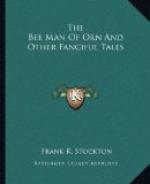When the Princess, with her Prince, reached her city, her uncles were very much amazed; for they had not known she had gone away. “If you are going to get married,” they said, “we are very glad; for then you will not need our care, and we shall be free from the great responsibility which is bearing us down.”
In a short time the wedding took place, and then the question arose in which city should the young couple dwell. The Princess decided it.
“In the winter,” she said to the Prince, “We will live in your city, where all is life and activity; and where the houses are so well built with all the latest improvements. In the summer, we will come to my city, where everything is old, and shady, and serene.” This they did, and were very happy.
The Gryphoness would have been glad to go and live with the Princess, for she had taken a great fancy to her; but she did not think it worth her while to ask permission to do this.
“My impulses, I know, are good,” she said; “but my appearance is against me.”
As for the Water Sprite, she was in a truly disconsolate mood, because she had left so soon the Land of the Lovely Lakes, where she had been so happy. The more she thought about it, the more she grieved; and one morning, unable to bear her sorrow longer, she sprang into the great jet of the fountain. High into the bright air the fountain threw her, scattering her into a thousand drops of glittering water; but not one drop fell back into the basin. The great, warm sun drew them up; and, in a little white cloud, they floated away across the bright blue sky.
SCRIBNER’S BOOKS FOR THE YOUNG.
Thirtieth thousand.
“In ‘Little Lord Fauntleroy’ we gain another charming child to add to our gallery of juvenile heroes and heroines; one who teaches a great lesson with such truth and sweetness that we part with him with real regret when the episode is over.”—Louisa M. Alcott.
* * * * *
Little lord Fauntleroy.
By Frances Hodgson Burnett.
Beautifully illustrated by R. B. Birch. One volume, square 8vo, handsomely bound. $2.00.
In “Little Lord Fauntleroy” the author of “That Lass o’ Lowrie’s” has given us a book which is absolutely certain to become one of the few real classics in the literature for children. She has presented a picture of child-life such as we have never had before; she has not only taken a subject quite new but she has written with such exquisite delicacy and sweetness the story of the little American boy’s career that even were the situations old the story would be a notable one.
“Little Lord Fauntleroy,” though a book for children, is certainly not a “juvenile” in the common use of the word, paradoxical as the statement may seem. The hero is a manly little fellow, a child, but with all the elements of a man. Mrs. Burnett has made Lord Fauntleroy a thoughtful boy, and she is right in believing that the stories children like best are those best worth thinking about when they are being read.




